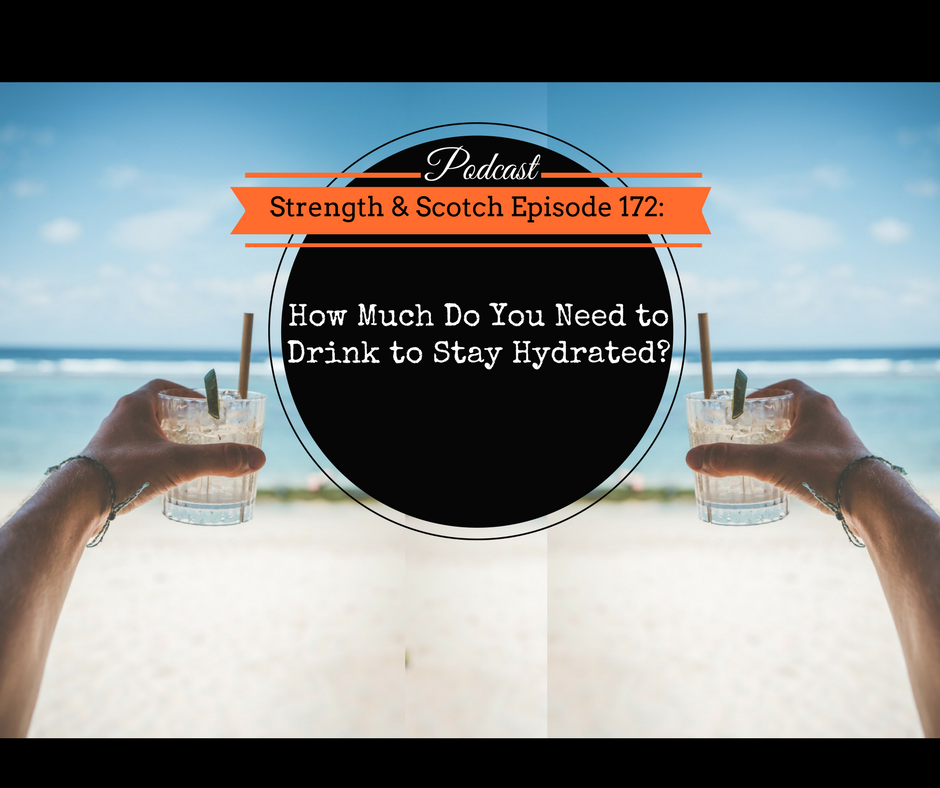SS 172 – How Much Do You Need to Drink to Stay Hydrated?
Episode 172 Show Notes
Today’s episode is unique as Heavey is joined by Grant straight from the bathtub. So here’s the good news: Grant is back!
He’s gone back to Crossfit (which Heavey thought would never happen). But he’s come up with this mechanism to make sure he continues to attend.
Plus, they cover a couple topics such as cycling and its role in the body’s immune system, with a focus on hydration – how much should you drink each day and other factors that affect dehydration. And whether water added to scotch is the biggest sacrilege you can do!
First off, a shout out to today’s sponsor. Check out the best rates you can get on life insurance with Health IQ.
[02:11] Grant’s Contract
Grant’s friend has been wanting to get in shape and because they were geographically too far apart to become gym buddies, they made a contractual agreement that they each exercise four times a week. It also stipulated that the exercise should be performed for x amount of minutes, the type of exercise, etc. and they would have to provide proof.
If either of them don’t complete a workout four times a week, they owe the other person $100 a week. If they both miss it, the $200 goes to charity. The contract even specifies which charity.
[04:53] Cycling Increases Your Immune System
Grant mentions this article stating that researchers in the U.K. examined the blood of 125 people over the age of 55 who have been regularly cycling for most of their lives. They looked into their immune system function and found that the senior citizens had the immune system of a 20-year old. Once you’re in your 20’s your immune system declines by 2%-3% per year. Part of the reason that older people are more susceptible to infections, arthritis, cancer, etc.
However, these cyclists have an immune system of a 20-year-old. Because of cycling, they had much higher counts of T-cells. Plus, flu vaccines are much more effective in these people because of their healthy immune systems.
Bottomline: People who are cycling have a stronger immune system than people who don’t cycle.
Heavey’s guess though is that those people who don’t cycle are probably the couch potatoes. Nevertheless, longevity is not entirely based on the immune system.
[08:05] Should You Drink 8 Cups of Water a Day?
Heavey reads a message from listener Steve who is curious about water consumption. He would like to know the importance of hydration for body composition, hypertrophy, and overall health.
Typically, what’s recommended is to drink eight cups of water, and a cup of water is equivalent to 8 oz. However, it’s not really clear where this came from. There is no scientific evidence to support it at all.
So to answer Steve’s question, Heavey is going to go with his common response which is that it really depends.
[11:20] Factors Affecting How Much Water You Should Drink
Grant’s hypothesis is that hydration depends on a lot of factors like age, weight, exercise, etc. The way to tell if you’re having enough is through the color of your urine. Heavey adds that factors like your size, health status, and environmental factors. For instance, a high-altitude place is very dry so you’d have to drink a lot more fluids than in an area where the humidity is higher. Basically, your body perspires as a cooling mechanism. If the perspiration evaporates into the air, then you would need to consume more water.
Heavey suggests that at the end of the day, thirst is really the best way that we’ve got to regulate and determine how much we should be drinking. There’s this myth that if you wait to be thirsty then you’re already dehydrated, but that’s being debunked now through research.
[12:50] Thirsty? Then Drink!
Thirst is triggered by our blood concentration (a rise of about 2%). Dehydration is characterized by a rise in blood concentration by 5%. So thirst precedes dehydration pretty significantly. So whenever you’re thirsty, that’s the time to drink!
Moreover, there are certain health conditions that can affect your thirst and your ability to regulate thirst to use that as a barometer for drinking and dehydration. For instance, diabetes and kidney disease can affect thirst, causing individuals to more carefully monitor their dehydration.
[14:30] Dehydration for Aesthetics
There are some people, bodybuilders for instance, where they dehydrate for aesthetics. It’s an acute thing where they do it right before an event. It’s not something they do on an ongoing basis. They’re doing it before an event to cut down weight, sometimes for a competition for a sport such as boxing or powerlifting, or just to cut down weight for bodybuilding to achieve a more shredded look.
Heavey adds that if you’re dehydrated over a longer period, it can lead to a more bloated type of look. Although not backed by research, this is something he has noticed firsthand with clients and with himself. If he’s not drinking enough over an extended period of time, his body gets into this mode where it’s thinking that it’s not going to get fluids. It responds accordingly by retaining fluids and looking softer than he would otherwise.
[16:50] Water and Scotch: Yes, They Could Go Well Together
A little bit of water can go a long way in enhancing the flavor to scotch. Heavey found this in those that are a little heavy with the alcohol, like bottled at 50% or 48%, and even 62% sometimes.
There is this perception that putting water in scotch is a shitty thing to do. But when Grant visited Scotland, a lot of the pubs would have water out for people to put a couple of drops into the drinks.
Grant agrees with this, adding that if you like the flavor better if you added water, and if that opens up the palette for you, then you should add a couple of drops. Just like Heavey, he would add water between every drink. His reason for this is that if you drink alcohol, you become dehydrated.
Moreover, one of the studies he found showed that if you excessively hydrate prior to drinking alcohol, you can substantially block the dehydration effects of the booze. The research also said that mild alcoholic beverages like beer, especially Bud Light, actually don’t really negatively affect your hydration status when consumed in smaller quantities. But if you’re drinking a lot then it’s going to affect it.
[19:40] Other Factors that Affect Rehydration and Retention
There’s also this perception and myth that caffeine is a diuretic that can cause dehydration, which can happen in certain individuals at large quantities of consumption. However if you’re having a couple cups of coffee or tea then that’s not a big deal.
Another thing to consider, as Heavey puts it, is the substantial water content in a lot foods. For instance, yogurt, eggs, and potatoes are nearly 75% water. Fruits, veggies, soups, and broths are full of water as well. However, we don’t necessarily consider this when we think about our daily consumption.
Lastly, when you think about athletes and people who train hard or have very rigorous jobs, these people may not be able to use thirst as a guide. They may be able to get themselves into a position where they become dehydrated prior to their need for water. If you’re someone who trains so hard regularly or you work outside all day doing physical labor, then you want to make sure you’re a little preemptive in your hydration. Also, consider consuming sodium with your beverages.
Moreover, the speed at which you consume the fluids affects your retention. So if you sit down and gulp a ton of water at once, you’re much more likely to excrete it than to retain it. It’s therefore best that fluids be consumed throughout the day instead of a couple big bursts.
Links:

Check out the gear page for everything Strength & Scotch! You’ll find a listing of all the supplements and other programs we’ve discussed on the show as well as our killer t-shirts!

